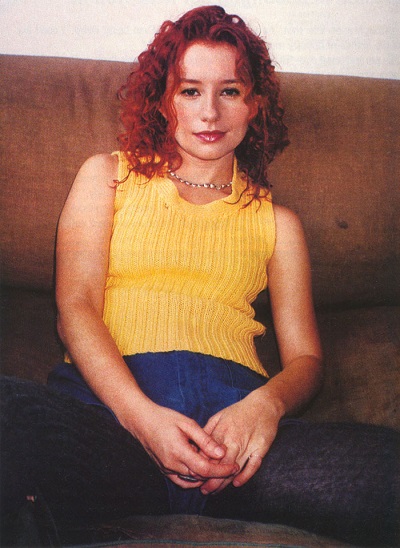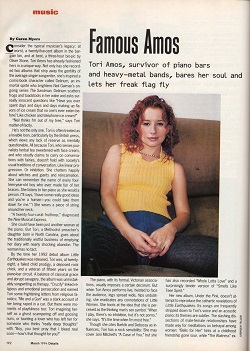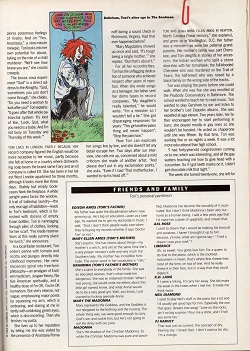|

songs | interviews | photos | tours | boots | press releases | timeline
Details (US)
March 1994

Famous Amos
Tori Amos, survivor of piano bars and heavy-metal bands, bares her soul and lets her freak flag fly
by Caren Myers
photo by Juergen Teller
Consider the typical musician's legacy: at worst, a twenty-five-cent album in the bargain bin, and at best, a three-hour bio-pic by Oliver Stone. Tori Amos has already fashioned hers in a unique way. Not only has she recorded two albums that strip away the gentility of the average singer-songwriter, she's inspired a comic-book character called Delirium, an immortal sprite who brightens Neil Gaiman's ongoing series The Sandman. Delirium scatters frogs and toadstools in her wake and asks surreally innocent questions like "Have you ever spent days and days and days making up flavors of ice cream that no on'e ever eaten before? Like chicken ice and telephone ice cream?"
"Neil thinks I'm out of my tree," says Tori matter-of-factly.
He's not the only one. Tori is often treated as a lovable loon, particularly by the British press, which views any lack of reserve as mentally questionable. All because Tori, who serves journalists herbal tea sweetened with face cream, and who stoutly claims to carry on conversations with fairies, doesn't hold with society's usual traditions of conversation. Like linear progression. Or inhibition. She chatters happily about witches and giants and reincarnation. She can remember the name of every fourteen-year-old boy who ever made fun of her braces. She listens to her piano as she would a person. ("It says, 'I have some really good ideas and you're a human -- could you take them down for me.'") She wears a piece of string around her neck.
"A twenty-four-carat fruitloop," diagnosed the New Musical Express.
She could have been just another woman at the piano. But Tori, a Methodist preacher's daughter born in North Carolina, goes about the traditionally wistful business of emptying her diary with nearly shocking abandon. The woman has no tact.
By the time her 1992 debut album Little Earthquakes was released, Tori was, at twenty-eight, a failed child prodigy, a deposed rock chick, and a veteran of fifteen years on the piano-bar circuit. A balance of classical grace and abrupt savagery, the album was unmistakably songwriting as therapy. "Crucify" linked religious and emotional persecution and earned Tori some frightening letters from religious fanatics; "Me and a Gun" was a stark account of being raped in a car. But there were moments of playfulness too: Tori imagining herself as a ghost scampering off and goosing nuns, or taunting a lover who has left her for someone who thinks "really deep thoughts" with "Boy, you best pray that I bleed real soon -- how's that thought for you?"
The piano, with its formal, Victorian associations, usually imposes a certain decorum. But when Tori Amos performs live, twisted to face the audience, legs spread wide, hips uundulating, she eradicates any connotations of Little Women. She hoots at the idea that she is perceived as the thinking man's sex symbol. "When I play, there's no inhibition, but it's not porno," she says. "It's the time when I'm most free."
Though she cites Bartok and Debussy as influences, Tori has a rock sensibility: She may cover Joni Mitchell's "A Case of You," but she has also recorded "Whole Lotta Love" and a surprisingly tender version of "Smells Like Teen Spirit."
Her new album, Under the Pink, doesn't attempt to reproduce the cathartic revelations of Little Earthquakes. Its songs are frequently stripped down to Tori's voice and an acoustic piano; its themes are subtler. The slashing selections of male-female relationships have made way for meditations on betrayal among women: "Bells for Her" hints at a childhood friendship gone sour, while "The Waitress" explores poisonous feelings of rivalry. And on "Yes, Anastasia," a nine-minute miniepic, Tori looks into her own potential for abuse, taking on the role of a child murderer: "We'll see how brave you are," she croons creepily.
The bossa nova experiment "God" is a direct address to the Almighty. "God, sometimes you just don't come through," she chides. "Do you need a woman to look after you?" Tori explains: "It's kind of like, 'Look, God, what you need is a babe. And I'm not busy on Tuesday and Thursday of this week.'"
TORI LIVES IN LONDON, PARTLY BECAUSE HER record company figured the English would be more receptive to her music, partly because she felt at home in a country where dishwashing soap bears the brand name Fairy and an oil company is called Elf. She has been in her latest West London apartment for three months, although it looks more like three days. Stately but empty bookcases flank the fireplace. A white upright piano faces the window. A trail of balled-up laundry -- the only real sign of habitation -- leads to Tori's bedroom, which is furnished with dozens of empty Evian bottles. Tori is rummaging through piles of clothes, looking for her scarf. "I've made reservations at this really yummy place for lunch," she announces.
In a local Italian restaurant, Tori orders penne with tomato and ricotta and plunges directly into childhood memories. Her reminiscences spiral into free-form philosophy -- an amalgam of Eastern mysticism, Jungian theory, Native American spirituality, and a healthy dose of I'm OK, You're OK humanism. But she's intense, not vague, emphasizing major points by squeezing my arm, which is endearing, and staring at me intently with unblinking green eyes, which is disconcerting. Then she finishes my pasta.
She lives up to her reputation by telling me she was visited by the presence of Anastasia Romanoff during a soundcheck in Richmond, Virginia. Had that ever happened before?
"Mary Magdalene showed up once and said, 'It's tough being a single mother,'" she replies. "But that's about it."
For all her eccentricities, Tori has the unflagging dedication of someone who achieved respect after years of rejection. When she wrote songs as a teenager, her father sent her demo tapes to record companies. "My daughter's really talented," he would write. "I'm a minister so I wouldn't tell a lie." She got disparaging responses for years: "This girl-and-her-piano thing will never happen"; "Stop the pain now."
Now Tori can explicate her songs line by line, and she doesn't let any detail escape her. Two days after our interview, she calls me up, concerned about a mild criticism she made of another artist. "And please don't put in any exclamation points," she asks. "Even if I said, 'That motherfucker, I wanted to rip his head off.'"
TORI WAS BORN MYRA ELLEN AMOS IN NEWTON, North Carolina ("near Hickory," she explains), and grew up in Washingon, D.C. Her father was a minister -- as were her paternal grandparents. Her mother's family was part Cherokee, and Tori delights in stories of her ancestors: the Indian woman who split a stone doorstep with her tomahawk; the full-blooded Cherokee who was murdered on the Trail of Tears; the half-breed who was raised by a black family on the wrong side of the tracks.
Tori was playing the piano before she could walk. When she was five she was enrolled at the Peabody Conservatory in Baltimore. The school wanted to teach her to read music. Tori wanted to play Gershwin by ear and listen to her brother's Led Zeppelin albums. She was expelled at age eleven. Two years later, her father encouraged her to start performing in bars; she played mostly in gay ones so she wouldn't be hassled. He acted as chaperone until she was fifteen. By that time, Tori was working five or six nights a week. It was a lot more educational than high school.
"I had forty-year-old congressmen coming on to me, which was interesting, and all the gay waiters teaching me how to give head with a cucumber. So if I got teeth marks on it, I didn't get chocolate milk that night."
The week she turned twenty-one, she left for L.A. to become a rock chick with big hair and plastic snakeskin pants fronting a pop-metal band. "I think I was trying to shock my grandmother more than anybody. And she was dead." But she still played piano bars in the evening. It paid the rent.
Her band, Y Kant Tori Read, which included, oddly, Matt Sorum (now the drummer for Guns N' Roses), released a self-titled album. It was not a success. Billboard called her a bimbo.
Tori sat on her kitchen floor for six months, wondering what she had done wrong. One day she went back to the piano and started writing for herself. "Silent All These Years," her first single, established her identity as a person as much as a performer. And the lines "Sometimes I hear my voice and its been here / Silent all these years" had a postfeminist resonance that the hot-babe fantasies of the metal scene couldn't encompass. Little Earthquakes went gold. This time, praise was universally florid.
IT'S SUNDAY AFTERNOON. TORI IS STANDING AT THE sink, kettle in hand. She looks momentarily perplexed. "Are you supposed to use cold or warm water for tea?" she muses. She makes two mugs of Mint Magic, offers me a licoricec-flavored toffee, and introduces me to her boyfriend and coproducer, Eric Rosse, who has just flown in from L.A. She's already told me all about Eric.
"He's been a huge help for working through this whole 'Me and a Gun' experience, in getting over my guilt for being passionate making love," Tori explained. "I would zone out sometimes and he would turn the lights on and say, 'What is my name? Who am I?' He would make me present and focused. 'What am I doing? I'm fucking you. And I love you.'"
Eric is handsome in a shaggy kind of way. We shake hands, and he discreetly disappears for a two-hour trip to the convenience store. Tori paces the floor restlessly, tugging at her overalls, reviewing her life. She is incapable of small talk. For Tori, as for Plato, a life uunexamined is a life not worth living. "If you aren't interested in learning, then you're just kind of plasma blobbing around," she asserts.
So she's always judging herself, trrying to figure out what makes her tick. "Why can't I just be more easygoing?" she fumes. "Why can't I have a sense of humor when I really want one and all I wanna do is scream?" She sighs. "I'm such a Viking -- I'm Sven with an avocado sandwich."
Night is falling, but Tori makes no move to turn on the lights. I can't read the questions in my notebook anymore, but it doesn't matter. Tori has probably asked them herself, in the self-analysis that won't finish when I'm gone. So I just listen, watching her face fade into the dark.
Friends and Family
Tori's personal pantheon
Edison Amos (Tori's Father)
My father was quite the disciplinarian when I was growing up. He's big on education -- even at a later age, he wanted me to get my doctorate in music. I said, "Dad, I don't think people really care when they're buying my records whether is says 'Doctor Tori' or not."
Mary Ellen Amos (Tori's Mother)
She's psychic. She has visions about things -- my mother's a witch, and yet at the same time she's a very proper minister's wife and very much the Southern lady. My mother has incredible fortitude. The worst word in her vocabulary is "rats."
Grandma (Tori's Father's Mother)
She's a saint to everybody in the family. She was an educated woman, that's what made her dangerous. She was an ordained minister. When I was young, she would write me letters about this little girl named Annie, and what Annie would do to be a very good girl. Well, you know, I just wanted to fucking grenade Annie.
Mary the Madonna
Mary represents the Goddess, and the Goddess is not relegated to the birthing and the nursing. The whole thing was, we were good enough to carry God's son and suckle him, but He's not going to soil His dinky with our juice.
Madonna
She's the shadow of the Christian Madonna. So while the Christian Madonna was pure and sanctified, Madonna has become the sexuality of it incarnated. But I don't think Madonna's been very nurtured as a human being. I said a few years ago that I'd make her a plate of spaghetti, and I mean that.
Axl Rose
I used to dream that I would be making Axl Rose broccoli and potatoes. I haven't brought it up to him because, y'know, what am I gonna say -- "I had a dream I was your cook"?
Liberace
Oh, so sweet. You gotta love him. For a queen to do that to the piano, which is the snottiest instrument -- I mean, that's where Brie cheese lives most of the time, on top of one. And he really threw it in their face, but in a way that they could digest it.
K.D. Lang
If I were a Viking, I'd carry her away. She did make me weak in the knees when I met her. It made me think twice.
Neil Diamond
I used to play Neil's stuff in the piano bar a lot and I'd usually get good tips for him. Especially the one that goes: (breaks into song) "Love on the rocks, ain't no big surprise / pour me a drink, and I'll tell you some lies."
PJ Harvey
That was just so current, the concept of dry. Feeling dry. I loved that. I don't wanna be dry. I'm a mango.
original article
 
[scans by Sakre Heinze]
[transcribed by jason/yessaid]
t o r i p h o r i a
tori amos digital archive
yessaid.com
|